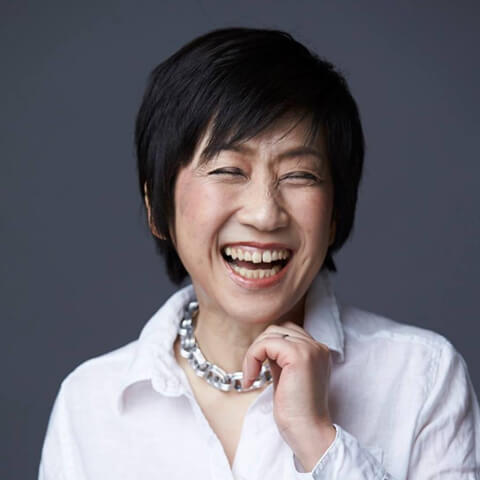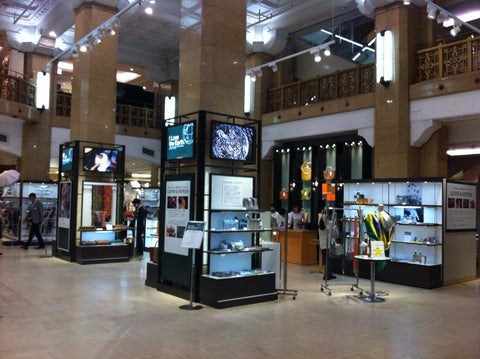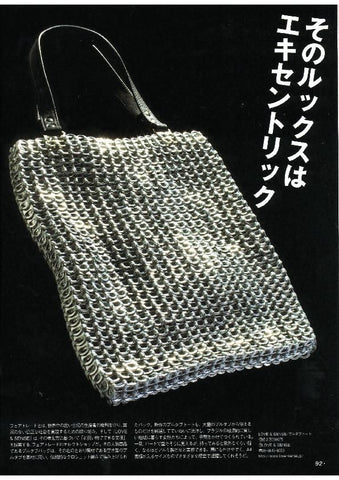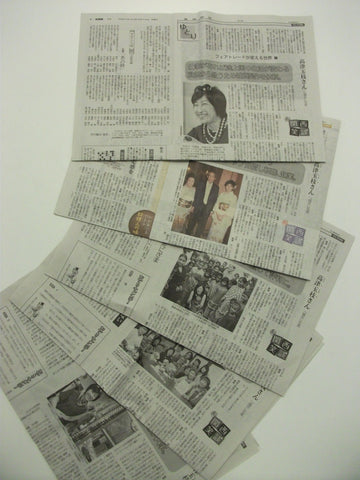Fair Fashion In Japan: Love & Sense

Fair trade fashion is a rapidly growing market segment in North America and Europe. But what is the market for fair trade fashion products in Japan?
Today we're interviewing an expert on fair trade in Japan, our friend, Tamae Takatsu. Tamae manages a series of pop up retail shops called Love & Sense in major Japanese department stores. She also has been a fair trade advocate for over fifteen years and has served on the board of OXFAM in Japan.

Tamae Takatsu, CEO of Fukuichi Co.,Ltd.
Escama: Hello Tamae! You have a unique approach to selling fair trade products, you're selling in Hankyu department store and to some of the most exclusive department stores in Japan. How do you do it? It would be difficult to pitch a fair trade themed pop up shop to Neiman Marcus, is Japan completely different?
Tamae: This is my own approach. Fair trade products in Japan are generally not positioned as high-end, or luxury items. I decided to take the 'path of most resistance'.

An early Love & Sense pop up shop in Takashimaya
Escama: The 'path of most resistance'? I like that! What exactly do you mean?
Tamae: More than 10 years ago, I was involved in establishing OXFAM Japan. I had the notion that the organization should retail fair trade products because I knew that OXFAM UK included product retailing among their activities. It turned out that it was difficult to do in Japan with some problems including the quality of the products. In those days, I gave up the idea to be involved in fair-trade, and ultimately I ended up running the shops by myself. I started to plan how to target a luxury market, an affluent clientele with high quality, high style products. That is what I mean by the path of most resistance.
Escama: But how did you follow the path of most resistance and actually end up in Takashimaya, Isetan, and Hankyu department stores? That's impressive.

Ground floor pop up shop at Isetan, the most popular store in Japan.
Tamae: It took many years, it didn't happen overnight. Early in my career, in the early 1990s, I had my own marketing company and my clients were department stores. I advised them with matters concerning merchandising, marketing and promotions. So I had connections with decision makers and I understood the culture of department stores. This was important but it was not the only factor.
Escama: What was your first exposure to fair trade and how did you start your first pop up?
Tamae: I became exposed to fair trade in 1998 and started to research artisan-made products on my own. I contacted the company People Tree and participated in their fair trade study tour to India in 2000. I gradually developed the theme for the store, (Love & Sense), started identifying products and made contacts with artisan groups. Then I arranged meetings with decision makers in department stores to convince them that fair trade was something that must be done. I told them that fair trade is necessary for other parts of the world. If we have marketing influence then we need to work with poor countries to increase fair trade.
National newspaper Sankei with circulation of 500,000 readers, covered the retail store Love & Sense, Tamae's business Fukuichi Co.,Ltd. and the fair trade movement for five straight days.
Escama: Did you convince them?
Tamae: Back then no. It wasn't time. But sometimes opportunities come by themselves. In 2006 the head of LOFT department store asked me if I knew anyone who could make a pop up shop in his store. I thought about it and decided 'I can do it'! I didn't have any experience doing a retail store. It was a disaster! No sales. The only sale was when my assistant bought a bar of chocolate. But the display was beautiful and we took lots of photos. Not long after that, a friend introduced Love & Sense to Omotesando Hills shopping center. It is one of the most elite shopping destinations in Tokyo. (Customers arrive there in Rolls Royce with chauffeurs, that kind of thing). It was a miracle! Our pop up shop was a hit in one of the best places in Tokyo. Because Omotesando Hills shopping center is so highly regarded, it opened the door for Love & Sense. Ever since then we have opportunities for pop up shops in department stores all over.
Escama: I love to hear stories like this! So for 10 years you have sold fair trade to the most affluent market segment in Japan. Do you have a feeling for how this has impacted Japanese views towards fair trade?
Tamae: In Japan, the biggest impact comes from famous shopping areas, never from the bazaars. Japanese people are insular and don't think about the outside world. So when famous department stores like Takashimaya, Isetan, or Mitsukoshi create promotions themed "I Love The Earth," "Global Green Campaign," it helps raise awareness from the top down.
10 Years ago I created the company Love & Sense to help promote fair trade in Japan. In 2006 we conducted a market research survey with 1,000 respondents and asked questions relating to fair trade awareness. Only 1% of people had any concept of fair trade, only 3% had heard the word. In 2015, according to the survey conducted by another organization, 50% of respondents had heard the word 'fair trade' and about 30% knew some of the concepts. Awareness of fair trade is becoming known in Japan through mass media. I have been doing media outreach for about 10 years and there's a growing interest in fair trade among Japanese people. 
Media outreach is another key to Tamae's success.
Escama: What's next for Love & Sense?
Tamae: Big things are happening in May 2016. A fair trade 'Ethical Week' promotion in Hankyu Department Store, the most popular department store in Osaka will run through May 10. The location of the promotion will be in the highest traffic area of the store and there will be many other smaller fair trade pop up shops, each with their own unique theme.
Escama: For more information about Hankyu, visit the link >>



Leave a comment